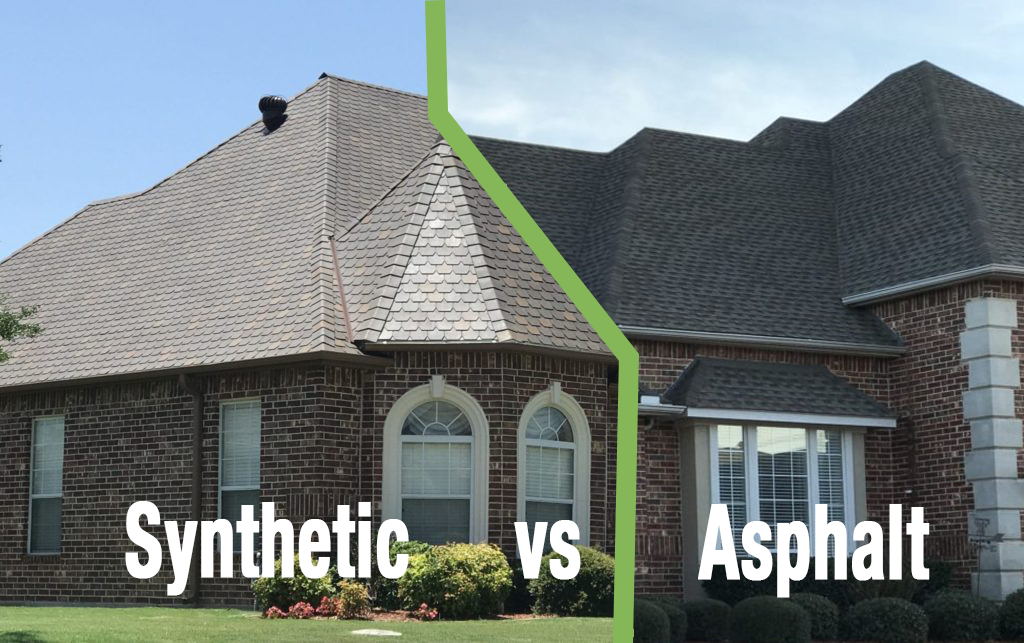A roof over your house is one of the most important investments you can make for your home and when it comes to putting a roof on a brand new house or replacing the roof on an existing house, there are many nuances and options. There’s two options in particular that we’ll take a look at and compare: synthetic (polymer) shingles vs. asphalt (composition) shingles.
Synthetic Shingles
You might find yourself asking, “what is a synthetic shingle?” In short, it’s a roofing shingle that’s usually made of a polymer, which is a science-y way of saying that it’s made of a combination of several different types of plastics and rubbers in ratios that produce the desirable amount of toughness, elasticity and viscoelasticity. Because of the way that these shingles are formed, the appearance is quite versatile – they are made into molds of existing, traditional roofing styles with convincing accuracy and often superior performance.
Synthetic shingles are also referred to as “composite shingles”, not to be confused with “composition shingles”, which is another name for asphalt shingles.
Asphalt Shingles
Asphalt shingles (a.k.a. composition shingles) are made of tar, fiberglass and granules of crushed stone and minerals.
They come in 3 basic types: 3-Tab, Architectural and Luxury.
3-tab are the least expensive of the asphalt shingle types and were the most commonly used for years, but as the architectural shingles began to be marketed more heavily, they grew in popularity and have now become the most commonly used. Architectural asphalt shingles (sometimes referred to as “dimensional”) are desirable due to their ability to mimic the appearance of a wood shake roof while luxury shingles have a comparable aesthetic to stone slate roofing. Luxury shingles, however, are about twice the cost of 3-tab shingles.
Synthetic Shingles Vs. Asphalt Shingles: A Comparison
There are several factors that come into play when deciding on a shingle, such as, fire rating, impact resistance, warranty, cost, lifetime expectancy and aesthetic to name a few, but we’ll mostly focus on the categories that are most general. The reason for this is that there are asphalt shingles that have different fire ratings and not all synthetic shingles have the same impact rating. We’ll focus on the 4 basic and most consistent factors according to type.
Curbside Appeal
Both synthetic and asphalt shingles do a fair job at providing a variety of colors and styles, however, synthetic shingles emulate cedar shakes and stone slates in a much more detailed manner. While asphalt shingles attempt to have a similar appearance with their architectural and luxury shingles, synthetic can get much closer to the real thing due to fitting a mold that’s taken from the actual type of shingle it’s attempting to emulate. There’s even synthetic shingles that look like asphalt shingles!
Lifetime Expectancy
One of the more important factors of shingles is simply, how long they are expected to last before a new roof needs to be installed. Asphalt shingles on average have a lifetime expectancy of 25-30 years while synthetic shingles, though they are new to the market and have yet to prove their lifetime, are expected to endure for around 50 years.
It’s important to note that in order to get the most life out of a roof, all of the components need to be compatible and installed correctly. This will have a big impact on how long the roof lasts.
Warranty Options
There is a difference between a workmanship warranty and a manufacturer warranty and it’s important to understand what separates the two. A contractor may offer a warranty on their work and in the instance that it can be proven that a roof system failed because of improper installation, the contractor would fix it with no or limited cost to the customer. A manufacturer warranty is something that is offered by the companies that make the product. If the product itself fails, then the manufacturer will replace it. Sometimes a manufacturer will have a relationship with contractors and will actually guarantee the work as well as the product.
An asphalt roof usually comes with a 25-30 year warranty, but if the contractor you hire is certified by the manufacturer and you have a whole roof system that the manufacturer offers installed, you’ll often have access to extended warranties, usually in the 40-50 year range.
Synthetic shingles haven’t been around long enough to prove their life expectancy, but it’s rare that a manufacturer isn’t willing to stand behind their product. You can usually find a 50 year
warranty on the product alone with a synthetic roof.
Cost
Every roof is different and the cost will vary depending on the pitch, slope and complexity of your house, but the real takeaway here is that you can expect to pay significantly more for a synthetic roof than an asphalt roof.
Asphalt Shingle Roof
$12,500 – $19,500: 1500 sq ft house
$19,500 – $25,500: 2500 sq ft house
$25,500 – $32,500: 3500 sq ft house
Synthetic Shingle Roof
$16,000 – $22,000: 1500 sq ft house
$22,000 – $35,000: 2500 sq ft house
$35,000 – $45,000: 3500 sq ft house
Asphalt roofs cost much less, but will also need to be replaced sooner than synthetic roofs and are more likely to require repair and maintenance throughout their lifetime.
Have Roofing Turtle Install Your Roof
Roofing Turtle specializes in a Texas-made synthetic shingle with a Class 4 Impact Rating and a Class A Fire Rating with a 50 year warranty. We are the expert in synthetic shingles in Bastrop County and pride ourselves in being experts in cutting edge roofing technology. Even if the synthetic option is not the route you want to go we can install other products including asphalt shingles, metal, and we even offer commercial roofs such as TPO and Coatings. “Protect Your Shell” by getting the last roof you will ever need! Give us a call at 1-833-688-7853 or get a quote online by clicking this link and filling your info.

